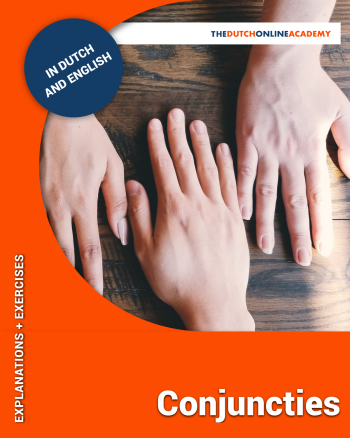Learn the theory
The imperative is used to express a command. Handy if you want to communicate quickly (watch out!) or just want someone to do something (ga weg!). To avoid friction, you can always soften the message a little bit. We come to that in a little while. Let's first take a look at how the imperative works.
Formula imperative: first person + rest + rest of verbs (if there are any)
As you can see, there is no subject in the imperative. Let's take a look at some examples.
- Ga zitten.
- Kom binnen.
- Doe het raam dicht.
- Leg je pen neer.
- Sta op!
- Zet je lege kopje in de keuken.
- Kijk uit.
- Schrijf alles op!
- Wees voorzichtig.
As you can see, there are some splittable verbs in the examples, as for example sta op (opstaan). The splittable part of the verb comes at the end ( here you can read more about splittable verbs).
The word wees can be new for you. It is a form of zijn. So the sentence wees voorzichtig translates as be careful!
In a more polite way
You can add various words to your imperative to make the message softer. Dutch people do this all the time using even. This would literally mean for a little while, but it also makes an order sound less heavy.
- Doe het raam even dicht.
- Leg je pen even neer.
- Hou eventjes op.
- Geef de planten even water.
- Doe even boodschappen.
Once you hear even, you'll hear it everywhere, because the Dutch just love it! Another way to make the message less harsh, is by adding a simple alsjeblieft.
- Laat me alsjeblieft met rust.
- Maak alsjeblieft je werk af.
- Kom alsjeblieft op tijd.
- Wees voorzicht, alsjeblieft.
- Hou alsjeblieft je mond.
Frustrating!
To express frustration, you add toch to the imperative. This word has multiple meanings and you can learn all about it here*. In the case of the imperative, it just adds a certain frustration, although your intonation shows how negative this frustration is exactly.
- Doe het toch zelf! (do it yourself already!)
- Doe het raam toch dicht.
- Ga toch fietsen! (go away and don't bother me!)
- Neem de telefoon toch op.
Impatience
Impatience is added bij using nou eens. You can use this when someone is repeatedly (not) doing something and you would like that to change. This construction can also be used with toch.
- Ga nou eens zitten.
- Kijk nou toch eens uit.
- Zet die televisie nou eens uit.
- Doe de afwas nou eens.
- Schiet nou toch eens op.
Practice with exercises
Look at the sentences and the word between brackets. Conjugate the verb to the imperative form.
comments
Login to leave a comment


![Learn Dutch with The double infinitive in Dutch [list of auxiliary verbs included]](https://images.ctfassets.net/f8l4gy5qxe00/7fpaN2iBE3h1xS7LRL8c0h/3bbebedc080cbf7eece73424c8e3918f/The_double_infinitive.png?w=350&h=495&q=50&fm=png)
